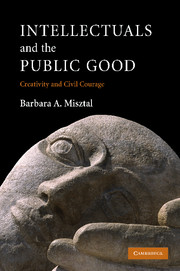Book contents
- Frontmatter
- Contents
- List of tables
- Acknowledgements
- Introduction
- Part I Theoretical framework
- 1 The authority of public intellectuals
- 2 Creativity: the problem of the new
- 3 Courage: acting on conviction
- 4 Typology of engagements
- Part II Public intellectuals: the case of the Nobel Peace Prize laureates
- Conclusion
- References
- Index
2 - Creativity: the problem of the new
Published online by Cambridge University Press: 22 September 2009
- Frontmatter
- Contents
- List of tables
- Acknowledgements
- Introduction
- Part I Theoretical framework
- 1 The authority of public intellectuals
- 2 Creativity: the problem of the new
- 3 Courage: acting on conviction
- 4 Typology of engagements
- Part II Public intellectuals: the case of the Nobel Peace Prize laureates
- Conclusion
- References
- Index
Summary
What is creativity?
Any attempt to define creativity is faced with the question as to whether creativity is a property of people, products or cognitive processes. And, if we assume that creativity is not a personal but a social phenomenon, we need to ask: what do we mean by creative work? Is creative work common or rare? And how are the attributions of creativity made (Mayer 1999; Sternberg 1988b)? All these difficulties are reflected in the variety of definitions of creativity. Dictionary definitions present it as the ability to bring something new into existence, the ability to use the imagination to make new syntheses and the ability to produce something that is considered both novel and original, while also stressing that the notion is connected with unusual brightness or intelligence. Moreover, dictionary definitions also tend to suggest that this concept is used to describe such people as Albert Einstein or Leonardo da Vinci, who have changed our culture in some important respect (Collins Dictionary of Social Science, Oxford English Dictionary, Encyclopaedia Britannica, Encyclopaedia Americana). The existence of more than 200 definitions (Weisberg 1993), ranging from the oldest conceptualisations viewing creativity as a talent reserved for a particular type of gifted personality – a ‘genius’ (for example, Kris 1952) – or as emerging from the associations of ideas in the unconscious (Arieti 1976) to definitions stressing dynamics of collaborative creativity (Kohut 1985), prompt some to argue that creativity defies precise definition. Others collect and classify existing definitions.
- Type
- Chapter
- Information
- Intellectuals and the Public GoodCreativity and Civil Courage, pp. 38 - 64Publisher: Cambridge University PressPrint publication year: 2007



